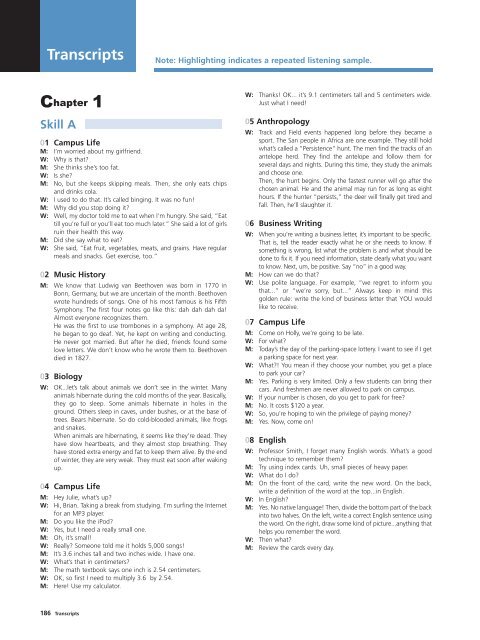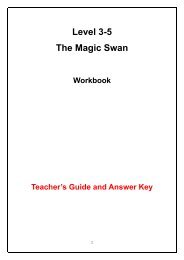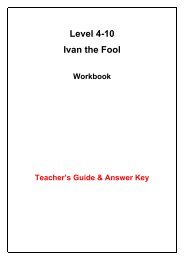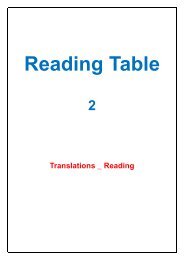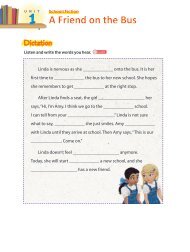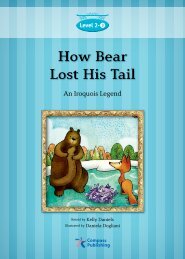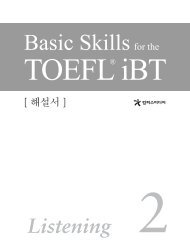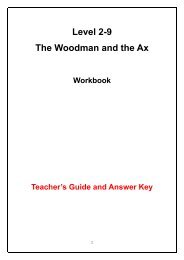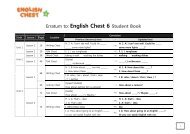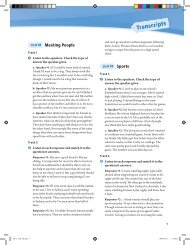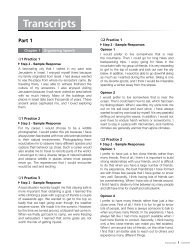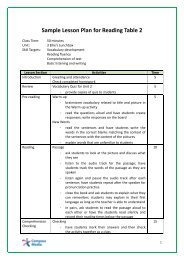Transcripts
Transcripts
Transcripts
You also want an ePaper? Increase the reach of your titles
YUMPU automatically turns print PDFs into web optimized ePapers that Google loves.
T TOEFL-Listening 2005.10.13 1:30 PM Page 186<br />
<strong>Transcripts</strong><br />
Note: Highlighting indicates a repeated listening sample.<br />
Chapter 1<br />
W: Thanks! OK... it’s 9.1 centimeters tall and 5 centimeters wide.<br />
Just what I need!<br />
Skill A<br />
01 Campus Life<br />
M: I’m worried about my girlfriend.<br />
W: Why is that<br />
M: She thinks she’s too fat.<br />
W: Is she<br />
M: No, but she keeps skipping meals. Then, she only eats chips<br />
and drinks cola.<br />
W: I used to do that. It’s called binging. It was no fun!<br />
M: Why did you stop doing it<br />
W: Well, my doctor told me to eat when I’m hungry. She said, “Eat<br />
till you’re full or you’ll eat too much later.” She said a lot of girls<br />
ruin their health this way.<br />
M: Did she say what to eat<br />
W: She said, “Eat fruit, vegetables, meats, and grains. Have regular<br />
meals and snacks. Get exercise, too.”<br />
02 Music History<br />
M: We know that Ludwig van Beethoven was born in 1770 in<br />
Bonn, Germany, but we are uncertain of the month. Beethoven<br />
wrote hundreds of songs. One of his most famous is his Fifth<br />
Symphony. The first four notes go like this: dah dah dah da!<br />
Almost everyone recognizes them.<br />
He was the first to use trombones in a symphony. At age 28,<br />
he began to go deaf. Yet, he kept on writing and conducting.<br />
He never got married. But after he died, friends found some<br />
love letters. We don’t know who he wrote them to. Beethoven<br />
died in 1827.<br />
03 Biology<br />
W: OK...let’s talk about animals we don’t see in the winter. Many<br />
animals hibernate during the cold months of the year. Basically,<br />
they go to sleep. Some animals hibernate in holes in the<br />
ground. Others sleep in caves, under bushes, or at the base of<br />
trees. Bears hibernate. So do cold-blooded animals, like frogs<br />
and snakes.<br />
When animals are hibernating, it seems like they’re dead. They<br />
have slow heartbeats, and they almost stop breathing. They<br />
have stored extra energy and fat to keep them alive. By the end<br />
of winter, they are very weak. They must eat soon after waking<br />
up.<br />
04 Campus Life<br />
M: Hey Julie, what’s up<br />
W: Hi, Brian. Taking a break from studying. I’m surfing the Internet<br />
for an MP3 player.<br />
M: Do you like the iPod<br />
W: Yes, but I need a really small one.<br />
M: Oh, it’s small!<br />
W: Really Someone told me it holds 5,000 songs!<br />
M: It’s 3.6 inches tall and two inches wide. I have one.<br />
W: What’s that in centimeters<br />
M: The math textbook says one inch is 2.54 centimeters.<br />
W: OK, so first I need to multiply 3.6 by 2.54.<br />
M: Here! Use my calculator.<br />
05 Anthropology<br />
W: Track and Field events happened long before they became a<br />
sport. The San people in Africa are one example. They still hold<br />
what’s called a “Persistence” hunt. The men find the tracks of an<br />
antelope herd. They find the antelope and follow them for<br />
several days and nights. During this time, they study the animals<br />
and choose one.<br />
Then, the hunt begins. Only the fastest runner will go after the<br />
chosen animal. He and the animal may run for as long as eight<br />
hours. If the hunter “persists,” the deer will finally get tired and<br />
fall. Then, he’ll slaughter it.<br />
06 Business Writing<br />
W: When you’re writing a business letter, it’s important to be specific.<br />
That is, tell the reader exactly what he or she needs to know. If<br />
something is wrong, list what the problem is and what should be<br />
done to fix it. If you need information, state clearly what you want<br />
to know. Next, um, be positive. Say “no” in a good way.<br />
M: How can we do that<br />
W: Use polite language. For example, “we regret to inform you<br />
that...” or “we’re sorry, but...” Always keep in mind this<br />
golden rule: write the kind of business letter that YOU would<br />
like to receive.<br />
07 Campus Life<br />
M: Come on Holly, we’re going to be late.<br />
W: For what<br />
M: Today’s the day of the parking-space lottery. I want to see if I get<br />
a parking space for next year.<br />
W: What! You mean if they choose your number, you get a place<br />
to park your car<br />
M: Yes. Parking is very limited. Only a few students can bring their<br />
cars. And freshmen are never allowed to park on campus.<br />
W: If your number is chosen, do you get to park for free<br />
M: No. It costs $120 a year.<br />
W: So, you’re hoping to win the privilege of paying money<br />
M: Yes. Now, come on!<br />
08 English<br />
W: Professor Smith, I forget many English words. What’s a good<br />
technique to remember them<br />
M: Try using index cards. Uh, small pieces of heavy paper.<br />
W: What do I do<br />
M: On the front of the card, write the new word. On the back,<br />
write a definition of the word at the top...in English.<br />
W: In English<br />
M: Yes. No native language! Then, divide the bottom part of the back<br />
into two halves. On the left, write a correct English sentence using<br />
the word. On the right, draw some kind of picture...anything that<br />
helps you remember the word.<br />
W: Then what<br />
M: Review the cards every day.<br />
186 <strong>Transcripts</strong>


